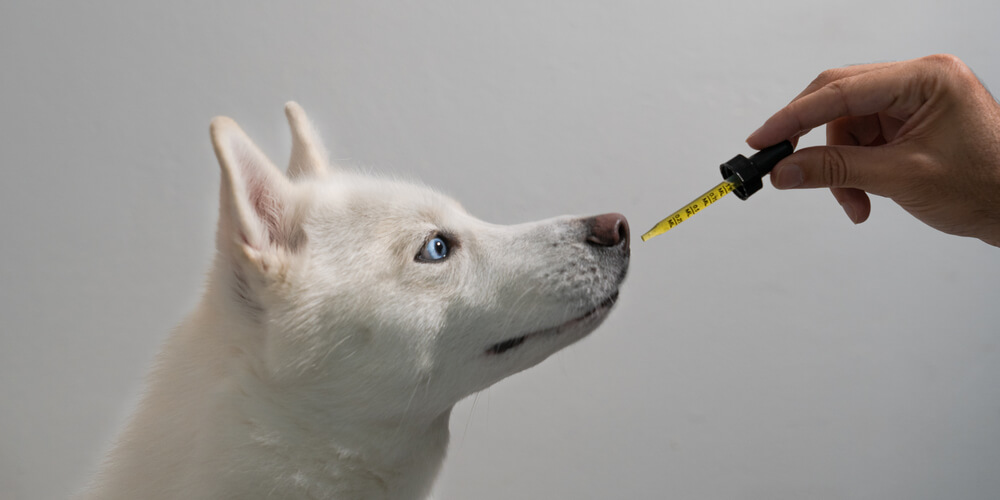Is CBD Safe For Your Pets?
April 3, 2020
In today’s world, pets are often treated like any other member of the family, and the connections that people have with their pets are often just as emotionally powerful. These connections can make it heartbreaking to see your pets suffering from a health condition when they are unable to speak for themselves and tell you what the problem is. When pets are ill, the first and usually best option is to see a veterinarian so that you can know for sure what the problem is. However, veterinarians can be prohibitively expensive, leading people to seek alternative treatments to solve pet health issues. Alternative therapies will flood search results online, and many of them at best won’t be helpful, and at worst, can even cause further harm!
These problems have led many people to be hopeful about the potential of cannabidiol or CBD. This compound is one of many compounds found in cannabis that are known collectively as cannabinoids. While the people proclaiming CBD to be a “wonder drug” are certainly exaggerating, the therapeutic potential of CBD is impressive. Clinical trials of CBD are few due to its somewhat-recent legality. Still, those that have been published show incredible results with few side effects and few interactions with other medications. Researchers found that CBD was effective as pain management in both mice and humans, as well as an anti-inflammatory. Anecdotal evidence shows possible anti-anxiety and antidepressant qualities, as well as benefits for the cardiovascular system and various side effects of cancer treatment.
When people hear that CBD is derived from cannabis, their first concern is usually about its legality. Their concern is understandable because until recently, any cannabis products or derivatives were considered a Schedule I drug under federal law, the same class as heroin and LSD. This changed in 2018, with the passage of what’s known as the 2018 Farm Bill. This bill removed certain cannabis-derived products, the most important of these being hemp. Hemp has long been the term used to describe cannabis grown not for recreational consumption but use in textiles, and hemp textiles have been used throughout human history as far back as 8,000 BCE.
The defining quality of hemp is the level of tetrahydrocannabinol (THC), which is the compound responsible for the psychoactive effects of cannabis. To be grown legally under United States federal law, hemp must have 0.3% or less THC content. CBD products that are available for general consumption have almost no chance of having the “high” effect you might associate with cannabis. These changes have allowed for hemp to be grown and processed for CBD, leading to the boom in CBD products you see today.
The advent of CBD as an alternative treatment has been a blessing for people suffering from all kinds of conditions, many of which have treatment options that unfortunately may be unavailable or have unpleasant side effects. As a natural product that undergoes little processing, CBD has few side effects and few interactions with other medications. CBD has also shown low potential for addiction. These benefits and their safety have made CBD a promising alternative for drugs like opioids and opiates, which can have serious side effects and interactions, and are commonly abused. This also means that CBD has potential as a safe tool for helping pets.
Thankfully for pet owners, all signs point to CBD being safe and well-tolerated by the physical systems of animals. The endocannabinoid systems of animals seem to be similar enough to our own that pets can enjoy many of the same benefits that humans can find in CBD. Many of the delivery methods that humans use to consume CBD are available to pets as well. CBD pet products are available in edibles that mimic traditional treats, oils that can be added to their regular meals, topical balms, and even peanut butter!
When shopping for CBD products, newcomers are often blindsided by the variety of products and the seemingly nonsense words on the label; CO2 extraction, ethanol extraction, full- and broad-spectrum, isolate? It can make the mind spin! Thankfully, once explained, these terms are relatively simple.
There are two main methods of extracting CBD from the cannabis material. Carbon dioxide extraction manipulates carbon dioxide from a pressurized solid into a liquid that then removes the cannabinoids without damaging or altering the compounds. The liquid CO2 then evaporates into a gas as the pressure is lifted, leaving behind the desired plant compounds. Ethanol extraction is even simpler than CO2 extraction but can affect the quality of the cannabinoids. Ethanol drips through compacted hemp material, almost like a coffee machine, extracting the cannabinoids as it goes. Most consumers prefer CO2 extraction due to the purity of the result, but the price tags may be higher for CO2-extracted CBD.
Once extracted, CBD can then be distilled even further, and is then classified into one of three tiers: Full-spectrum, broad-spectrum, and isolate. These tiers are differentiated by the amount of remaining phytochemicals in the CBD, which combine with CBD to increase its benefits in what’s called the “entourage effect.” Full-spectrum contains the full array of compounds found in hemp, including trace amounts of THC. This composition provides the most comprehensive benefits of the chemicals found in cannabis. Still, the trace amounts of THC can produce a false-positive on a drug test and may not be desirable for pet products, as THC is known to be toxic to pets. Broad-spectrum is very similar to full-spectrum but has had the THC entirely removed. Isolate is the purest distillation of CBD available and thus has a higher concentration than full- and broad-spectrum.
The solutions that CBD can provide for us can also relieve some of the most common health conditions in pets. Dogs are prone to arthritis as they age, with some estimates claiming 1 in 4 dogs will be affected by arthritis. Arthritis in dogs is visible in the same way it is in humans. As the cartilage deteriorates between a dog’s joints, the bones begin to come in closer contact during movement. This causes pain with nearly any action involving the affected joints. A dog suffering from canine arthritis, especially an older dog, will be apparent. Stiff movements, limping, and unwillingness to go on walks are frequent. A dog suffering joint pain can even stop eating or become aggressive. CBD ingested as an oil or edible treat, or applied directly to the painful joint can relieve the worst symptoms of arthritis and help your pet live a healthy lifestyle.
One of our favorite CBD treats for dogs is BUDAPETS Joint Care Soft Chews. These soft treats are an excellent choice for dogs experiencing joint pain. These treats contain organic hemp extract to lubricate joints with omega fatty acids, and organic turmeric to complement the anti-inflammatory properties of CBD. They also contain hyaluronic acid derived from green-lipped mussels to hydrate cartilage and glucosamine to help your dog’s body build more cartilage. Taking Budapets Joint Care Soft Chews will surely help return your dog’s mobility.
For picky dogs, we love MedTerra’s CBD Chicken Flavored Tincture. If you’ve tried edible CBD treats, then this is an easy way to get your furry friend to take their dosage. This 750mg concentration makes it perfect for a dog who needs a little more than a CBD treat can provide. Our recommendation is to use it for an anxious dog who might need some help calming down for a long car ride.
Our last recommendation for dogs is another product from BUDAPETS. If you’re someone who likes to get up close and personal with your dog, then you’re undoubtedly familiar with how stinky a dog’s breath can be. BUDAPETS Dental Treats are the perfect choice to improve your dog’s dental hygiene because of their firm, hard texture that cleans plaque and tartar from their teeth as they chew. With these chews, you can give your dog their CBD dose and teeth cleaning with one purchase!
Cats and dogs are classic opposites, but cats can benefit from CBD too. Cats can have many of the same problems as dogs that can be solved or remedied by CBD. Feline arthritis is nearly as common as canine arthritis, and CBD products are available formulated just for cats.
Anyone who’s tried to convince an unwilling cat to do nearly anything can tell you about just how difficult it is, and they might have the marks to prove it. CBD oil can help a cat relax, making it considerably less dangerous to clip your cat’s nails, bathe them, or get them to the vet. We love Canniant’s CBD Cat Oil because it comes in a cat-friendly tuna flavor and in 100mg and 200mg concentrations, which is useful for those with an especially cranky cat.
CBD can be an incredibly valuable tool for a pet owner. Whether it’s for your companion who needs pain relief to chase a tennis ball or a cat whose joints make it hard to jump up on the counter, CBD can be a natural alternative to an expensive veterinarian trip. Now you know that CBD is safe for almost any pet, and hopefully, our product recommendations can give you a headstart!






